6 feet
3 feet


2a
White Spruce
Blue Teardrop Spruce is a dwarf conifer which is primarily valued in the landscape or garden for its distinctively pyramidal habit of growth. It has attractive bluish-green foliage with hints of silver. The small needles are highly ornamental and remain bluish-green throughout the winter.
Blue Teardrop Spruce is a dense multi-stemmed evergreen shrub with a distinctive and refined pyramidal form. It lends an extremely fine and delicate texture to the landscape composition which can make it a great accent feature on this basis alone.
This is a relatively low maintenance shrub. When pruning is necessary, it is recommended to only trim back the new growth of the current season, other than to remove any dieback. Deer don't particularly care for this plant and will usually leave it alone in favor of tastier treats. It has no significant negative characteristics.
Blue Teardrop Spruce is recommended for the following landscape applications;
- Accent
- General Garden Use
Blue Teardrop Spruce will grow to be about 6 feet tall at maturity, with a spread of 3 feet. It has a low canopy, and is suitable for planting under power lines. It grows at a slow rate, and under ideal conditions can be expected to live for 50 years or more.
This shrub does best in full sun to partial shade. It prefers to grow in average to moist conditions, and shouldn't be allowed to dry out. It is not particular as to soil type or pH. It is somewhat tolerant of urban pollution, and will benefit from being planted in a relatively sheltered location. This is a selection of a native North American species.
